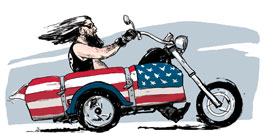
Illustration: Jed Morfit
“I’ve been here before,” announced Glenn Palmer as he eased his bloodred Harley Sportster into the parking lot of the Salas Brothers funeral home in Modesto, California. The lot was awash in black leather and cigarette smoke as he dismounted and circled up with the several dozen other riders who’d come out to escort a soldier killed in Iraq to her final resting place. The war has taken a heavy toll on California’s Central Valley, and Palmer had already visited this funeral home twice this year.
“Welcome home, brother,” the chain-smoking, ponytailed, 55-year-old Vietnam vet said, throwing an arm around a grizzled buddy. In the downtime before the hearse departed for the church, the bikers swapped stories about the reactions they’ve gotten when people see an American-flag-flying honor guard composed almost entirely of burly dudes on motorcycles. Passers-by have thanked them and wept openly, an antiwar funeral attendee once chewed them out, and then there are the “uglies”—the uninvited guests who inspired the creation of this unconventional biker gang in the first place.
The Patriot Guard Riders formed last November to confront fundamentalist pastor Fred Phelps’ Topeka-based Westboro Baptist Church, whose parishioners have been picketing soldiers’ funerals with signs reading “Thank God for Dead Soldiers” and claiming that dead GIs are divine punishment for America’s tolerance of homosexuality. The Patriot Guard Riders started accompanying the families of dead soldiers (with their consent) from wake to church to cemetery, riding in a proud parade of chrome and gasoline fumes, sometimes blocking the protesters from view with flags and gunning their engines to drown out renditions of “God Hates America.” More than 30 states have passed or are now considering legislation limiting protests at funerals. “I understand their right to freedom of speech, but they have to understand the right of a family to grieve,” said ride captain David “Scooter” Bolton.
The riders now claim more than 33,000 members, compared to Phelps’ dozens. About three-quarters of the riders are military vets. “You’ll find some of the older fellows here like myself who are Vietnam veterans that came home to a really indignant situation,” said Palmer, who served two tours of duty in the Army. “I was spat on at the airport and called a baby killer when I came home, by a little old lady about 70 years old.”
The group’s civilian membership is growing, too. People have started showing up on Vespas, and even in “cages”—biker slang for cars. “There is something bigger going on here,” spokesman Kurt Mayer said, “this raw underlying patriot nerve we’ve hit in America, where people are saying, ‘I’m having trouble identifying with this war and this conflict, but I recognize that there are soldiers who are young men and women who are committed to this country. How do I support these soldiers?’” The Modesto riders insisted they are neither counterprotesters nor activists. “Our mission statement is strictly in support of the troops and their families,” said Palmer. “That’s all we do,” agreed California state captain Cheryl Egan, a platinum-haired wisp of a woman on the back of Scooter’s Indian Chief. “Political beliefs don’t come into it.”
On this day, the riders were paying their last respects to Lance Corporal Juana Navarro Arellano, a 24-year-old Marine killed by small-arms fire in Iraq’s Al Anbar province on April 8. Holding flags, they lined up and saluted her casket as it was carried inside the church, then waited politely outside in their sweltering leathers for the length of a Catholic Mass. There was much sniffling and eye-dabbing as the coffin passed by on the way back to the hearse, something the audibly choked-up Bolton gruffly blamed on the pollen count.
Then the bikes roared to life and joined in a thunderous procession to the cemetery, where Navarro was honored with a 21-gun salute, and her mother was presented with the Purple Heart. After hours of stifling heat and sadness, the ear-rattling chorus of motorcycle engines seemed life affirming, even defiant. As the Patriot Guard Riders peeled away from the cemetery, another mission accomplished, a little old lady in a sedan pulled up alongside Palmer. She took in his leather jacket, studded with military pins, and the American flag bungeed to the back of his seat, and then, solemnly, nodded her head and started to applaud.











